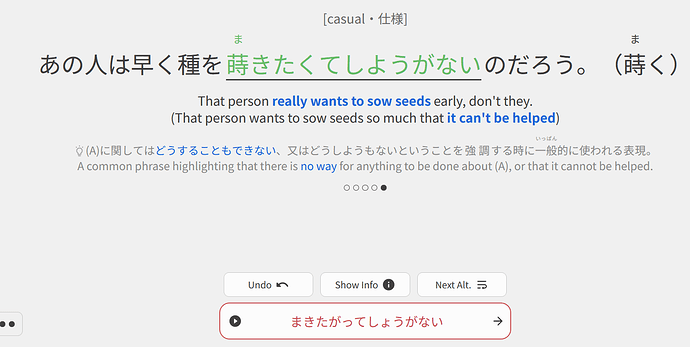So, I’ve gotten a review for てしょうがない and when I saw this sentence I thought "It talks about another person’s wish or desire, so I should use たがる, but bunpro said it’s wrong, and uses たい, why?
Well, your question about why it does accept plain たい seems valid to me.
Mistaken hypothesis, later disproved
However, I can tell you why it did not accept your answer, and it (probably) doesn’t have to do with your usage of たがる:
In your answer you have しょうがない instead of しようがない. The latter will match the grammar point 仕様がない, but the former will not, because of the small ょ in しょ, rather than the correct しよ.
Notice that there are five circles indicating five possible answers. I’m guessing that one of the possible correct answers is まきたがってしようがない which matches 蒔きたがって仕様がない.
I just checked and both しょう and しよう versions work for this sentence and there is no がる answer.
I believe the answer here is that がる implies that you have no idea and no way of finding out whether someone wants to do something. That is why you don’t use がる but use たい when directly asking someone if they want to do something. In the example sentence there is already a degree of certainty in that the person wants to sow seeds implied by the phrase しょうがない. It’s like saying “no wonder that person wants to sow seeds early” or something like that. You’re not really guessing that, even though the English translation might imply that.
Just a guess though.
I’m sorry, but your explanation is not correct. The grammar point is てしょうがない
Of course I have cycled through the possible answers, this was just the last of the possible ones, when I took the screenshot.
Here’s the grammar point.
I was taught, that one should never ever use たい when talking about what other people want, because it is rude to just assume to know what the other person thinks. One should always use たがる in that case.
So, I am confused as to why first of all たがる is wrong, and second of all why たい is even acceptable in this sentence? This seems like some kind of oversight, or mistake?
I stand corrected!  My mistake. I haven’t gotten to that grammar point yet.
My mistake. I haven’t gotten to that grammar point yet.
I agree. I had heard this as well. (Actually, I even re-learned this after re-watching a Cure Dolly video on how Japanese handles things like ‘desire’.)
I’m not denying that this might be an oversight. I don’t see がる that often to begin with so I didn’t really internalize it well enough to be sure of my answer. However you will use たい when speaking about others. The best example that probably anyone has heard of is 何か食べたい? which is what I’ve been pointing at in my previous comment. In this case you don’t have to assume anything from a third person perspective because you have the means to know and will soon find out. I just applied the same logic to the example sentence, in which the person seems almost certain of the other person’s wants by using a phrase like しょうがない. You can read more about when using たい is allowed for example here: word choice - Can たい and たがる be used for a 1st/2nd/3rd person’s desire? - Japanese Language Stack Exchange, and also here is a native’s opinion about these two:  What is the difference between “たがる” and “たい” ? “たがる” vs “たい” ? | HiNative
What is the difference between “たがる” and “たい” ? “たがる” vs “たい” ? | HiNative
彼は(厚手の服が好みなので)厚い服を着たがる、これは今だけでなくこれまでの時間を含んで厚い服を着たいと思っている
彼は(寒いので)厚い服を着たい、これは今すぐにでも厚い服を着ようとしているという現在の意味が強い。
So I guess to sum it up, never say never.
The main thing we can’t do with たい is assert what a third person wants*. Questions are fine (do you want to…?), hearsay is fine too (he said he wants…). The sentence in question is speculative (…だろう), so it’s not an assertion either.
The speaker is also speaking from the perspective of the third person. たがる can’t be used in that case.
* Actually even assertions are fine as long as we actually know for a fact what the person desires. But this is pretty rare, for example the narrator in a fictional story can do it when talking about one of the characters.
Nekoyama is exactly correct. Just to add:
It isn’t because it is rude (although I guess it could be), it is because it sounds bizarre. You can kinda recreate a similar feeling by making the subject of a sentence “you” in English. E.g., “You want to go to the park”. As a statement of fact this is just a bit weird. In English we can say “She wants to go to the park” but even then it does have an implication that you know for a fact that she wants to go. So saying “She said she wants to go to the park” or “You seem like you wanna go to the park” etc etc sounds more natural. The exact phrasing depends on the sitatuation obviously. Japanese is exactly the same but even more so.
-がる is more complicated than it seems at first as well. It is taught to beginners I think to avoid people saying nonsense sentences but the actual usage and meaning is not just “used to talk about other people’s desires”. がる can even be used to talk about yourself although only in very limited cases. The actual meaning is to do with how the speaker thinks somethings is or how they feel something is and/or it means some behaviour is pretending to look a certain way. Essentially it is related to how things seem from the outside (which is how it is possible to use it to talk about yourself).


